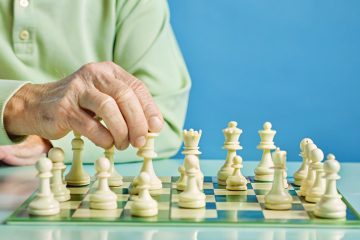Chess and Emotional Intelligence: Building Better Relationships
In today’s fast-paced world, the ability to connect with others and navigate the complexities of human relationships is more important than ever. At the heart of this skill set lies emotional intelligence, the capacity to understand and manage both your own emotions and those of others. While many paths lead to the development of emotional intelligence, one of the most intriguing and effective ways is through the strategic game of chess.
Chess and emotional intelligence may seem like an unlikely pairing at first glance, but they are deeply interconnected. This ancient game, known for its mental rigor and strategic depth, also offers profound opportunities for emotional growth. Beyond the 64 squares of the chessboard, players are constantly challenged to remain composed under pressure, anticipate their opponent’s moves, and reflect on their own emotional responses. These are the very skills that form the foundation of emotional intelligence.
As we delve into the world of chess, we’ll explore how this game can significantly enhance emotional intelligence and, in turn, lead to better relationships in every aspect of life. Whether you’re a seasoned chess player or new to the game, understanding the link between chess and emotional intelligence can open up new avenues for personal growth, helping you navigate both the chessboard and your interpersonal relationships with greater insight and effectiveness.
- How does chess help in developing emotional intelligence?Chess enhances emotional intelligence by improving self-awareness, self-regulation, social awareness, and relationship management. The game challenges players to recognize and manage their emotions, anticipate others' moves, and reflect on their decisions, all of which are key components of emotional intelligence.
- Can playing chess improve my relationships?Yes, playing chess can improve your relationships by teaching patience, empathy, and conflict resolution skills. The strategic thinking and emotional control developed through chess can be applied to better navigate and manage real-life interactions.
- How often should I play chess to see improvements in emotional intelligence?Regular practice is key. Playing chess frequently—whether daily or weekly—allows you to continuously hone your emotional intelligence skills, leading to noticeable improvements over time.
- Does playing online chess offer the same emotional intelligence benefits as playing in person?Playing online chess can offer similar emotional intelligence benefits, such as strategic thinking and emotional control. However, in-person play adds the advantage of face-to-face interaction, which can further enhance social awareness and relationship management skills.
Understanding Emotional Intelligence
Before getting into how chess can help a person enhance their emotional intelligence, let’s consider what Emotional Intelligence really is. The conventional segmentation of emotional intelligence into four core components includes :
- Self-Awareness: The ability to recognize and understand one’s own emotions.
- Self-Regulation: The capacity to manage and control one’s emotions, particularly in stressful situations.
- Social Awareness: The ability to empathize with others and understand their emotions.
- Relationship Management: The skill of managing interactions with others, including the ability to influence, inspire, and resolve conflicts.
Mastering the elements of one’s emotional intelligence will yield better communication, closer relationships, and hence a fuller life. Let’s look at how the game of chess can foster each of these elements.
Chess and Self-Awareness
Self-awareness is the root of emotional intelligence. It implies perceiving one’s emotions while they are occurring and understanding their effects on thoughts and actions. Chess can provide a powerful tool for developing self-awareness.
While playing chess, especially during competitive play, you are kept facing your emotions: frustration from having made a blunder, excitement from having created a winning move, or anxiety from being in a tough position—chess brings all your emotions to the fore. If you play chess regularly, the more sensitive you will become to such emotional responses. These would help you recognize emotional triggers in other spheres of life.
Moreover, chess requires some amount of introspection. After the game, players often sit to analyze what happened by their and their opponent’s sides. He, in effect, looks back to see what he did right or wrong. Such a post-game analysis from a player acts as a form of self-reflection that enhances self-awareness, forcing one to confront the ways his cognitive and emotional processes unfolded during the game.

Chess and Self-Regulation
Self-regulation is the ability to control and manage one’s emotions, most of the time when one is provoked. One cannot play chess in anger. A single emotional outburst results in impulsive decisions, which eventually lead to loss.
Chess teaches one that composure has to be maintained at all times. Whether your opponent makes an unexpected move or, whether you lose continuously, chess is a game that teaches its players to manage emotional responses and maintain a cool head while looking through the playing strategy.
As time goes by, this practice of controlling your emotions over the board gets translated to better self-regulation in everyday life. Be it during an argument with a loved one or simply handling stressful situations at work, the skills you build through chess will help you deal with your emotions more effectively.
Chess and Social Awareness
Another key component of emotional intelligence is social awareness, which is the ability to be aware of and sensitive to others’ thoughts and feelings. Whereas chess players are often perceived to be loners, in some respect this helps them develop social awareness.
In playing chess with someone, one needs to put oneself in the other person’s shoes all the time. You will need to think of their strategies, their moves, and what motivates them. Doing this will cultivate empathy and social awareness.
Moreover, chess at a community place—be it a club or an internet site—brings together opportunities to increase the possibility of improving your social life and your relationships. You will have an opportunity to get much better interpersonal skills and insight into human nature by interacting with fellow players, exchanging strategies, and reviewing games.

Chess and Relationship Management
Relationship management, the last component of emotional intelligence, refers to effectively managing one’s relations with other people. Chess can help a person in this component in a number of ways.
The first things that chess teaches you are patience and respect. One has to respect the strengths and decisions of the opponent while playing against a beginner or a grandmaster in chess. That respect can translate into better relationship management in other areas since it builds the habit of valuing and respecting other people’s viewpoints.
It helps in sharpening the art of conflict resolution. A game of chess is, in many ways, a set of several small-scale conflicts where every move is a challenge to the opponent, and the responses are an attempt at finding a resolution to it. The strategies of resolving these differences over a board game will improve the way you handle disagreements and issues within real-life relationships.
Finally, chess fosters the development of healthy competition. While being a competitive game in itself, it imparts the positive values in sportsmanship and mutual respect. These are important and beneficial in sustaining good relationships.
Practical Applications: Using Chess to Enhance Emotional Intelligence in Daily Life
Although the theoretical connection between chess and emotional intelligence is important, its real value lies in application. Here are some practical ways through which chess can help you enhance your emotional intelligence and build better relationships:
- Regular Play and Reflection: Integrate chess regularly into your life. After each game, reflect on emotional responses and decisions you have made throughout. Identify how these types of findings can be applicable to interactions between you and others.
- Engage with a Community: Join an online chess club or chess forum to play against other members and discuss the game. This will create opportunities for practicing social awareness and relationship management.
- Practice Emotional Control: The ability to be cool, calm, and self-composed in chess in really terrible positions needs to be developed. Hone this emotional control into other areas of your life.
- Consider the Opponent’s Perspective: Now, try doing this in every game: While you are playing, actually attempt to think as your opponent would. This will sharpen your sense of empathy and the ability to see things from another person’s perspective.
- Apply Chess Strategies to Relationships: Consider your relationships like a game of chess. At times, what comes in handy in tiding over conflicts better and managing interactions in a more orderly manner is some strategic thinking, patience, and respect.
For more insights and resources on the benefits of chess, visit startendchess.com


Chess means so much more: a journey into the depth of your mind and your emotions, where strategic victories are only a part of it all. While you struggle with the issues of chess, what you actually do is develop your emotional intelligence, something that takes you beyond the board and enhances each interplay of your life. Every move that is made by you, every challenge faced by you, grows further self-awareness and emotional control, together with empathy—the ingredients for better and more meaningful relationships.
Imagine what can be realized when you apply these lessons beyond the 64 squares. Patience practiced in a long, hard game; empathy you have learned by seeing things from the opponent’s angle; strategic thinking developed—all this can change fundamentally how you go about the complexities of real-life relationships. Chess serves as a training ground for emotional mastery and for those very qualities that lead to victory not only on the board, but to deeper connections and more fulfilling interactions in every sphere of life.
Pressed for time or prefer listening? You can listen to the podcast version of this article instead! Just click below to hear the content narrated for your convenience :
References:
- Goleman, D. (1995). Emotional Intelligence: Why It Can Matter More Than IQ. Bantam Books.
- Brackett, M. A., & Caruso, D. R. (2004). “Emotional intelligence and the importance of emotional self-awareness.” Emotional Intelligence: Key Readings on the Mayer and Salovey Model, 82-94.
- Schneider, T. (2019). “The impact of chess on emotional intelligence: A study of chess players.” Journal of Social Psychology, 159(4), 455-470.
- Sala, P., Gobet, F., Trinchero, R., & Ventura, S. (2017). “Chess and emotional intelligence: The potential for improved interpersonal relationships.” Educational Psychology Review, 29(3), 451-474.
- McHugh, R. K., & Keng, S. L. (2018). “Mindfulness and emotional intelligence: Understanding the connection.” Journal of Clinical Psychology, 74(12), 2033-2042.
- Cohn, M. A., & Fredrickson, B. L. (2009). “Positive emotions increase resilience in individuals.” Psychological Science, 20(3), 340-347.
- Wilks, R. (2019). “Developing emotional intelligence through chess: Practical applications.” International Journal of Educational Psychology, 8(2), 176-198.



0 Comments